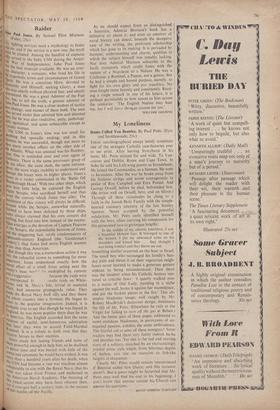Raider
fighting services need a mythology to foster 2ralei and if the service is a new one, the myth '"List be created Among the handful of captains ca served in the baby USN during the Amer-- War of Independence, John Paul Jones ds the best material available. He was an over- t,.'e character, a romantic, who lived his life in hyperbolic terms and circumstances of Grand hPera. He was a conscious Hero, devoted to urnanity and Himself, seeking Glory; a man .,re'h was utterly without physical fear, and utterly us termined. He was a great Admirer of the Fair jex,,' hut, to tell the truth, a greater admirer of ,°"h Paul Jones. He was a close student of tactics and strategy, and master of them both. The men ,..ho served under him admired him and detested :h1, for he was also vindictive, petty. pathologi- ,d'IY egotistical, and quite unbearable except to °Pretty woman. rhe USN in Jones's time was too small for `tbllYthi
business but sporadic raiding; and in this
than he was successful, though not more so the many another officer on the other side of e `‘Ilantic. What was unusual was his flamboy- c:e. One is reminded over and over again of chrane. There is the same passionate grasp of the sea affair, the same dash, the same intransi- gence. the same tragic inability to understand and manage the lesser men in higher places. Jones's e,. 13..eer as a raider culminated in the 'Battle Off aMborough Head.' With two other ships, which t.,ve him little help, he captured the English „gate Serapis, who sacrificed herself and thus saved the convoy which Jones was after. The assessment of this victory will always be difficult, 7, cause while the Serapis, somewhat naturally, j'ainled to have been defeated by three ships, 1,°„,11,,e.s always claimed that his own consort did \('',,"hg, but fired into him instead of the enemy.
t emerges is the devotion of Captain Pearson
the Serapis, the indomitable heroism of Jones, :nd the staggering fact, surely condemnatory of eighteenth-century England (the 'Gentleman's e "tura that Jones had more English seamen "ibis ship than American. Aut though this was a tremendous action it was Only the colourful crown to something far more !hPortant. Jones understood exactly how the orlIbral effect of a small force acting near the 'ne'hY's base tie multiplied by rumour arid
exaggeration • because the raids were he unexpected. H land() raids on White-
haven and St. Mary's Isle, trivial in material et, had immense propaganda Value. They hipde the Royal Navy look silly and they threw ine whole country into a ferment. He began to °hill in the popular imagination. Indeed, it is - 1[,)-r)b,ahlY true to say that though he was feared in ,"giand, he was more popular there than he was n America. The English accorded him the same ti leashre of rueful, semi-humorous admiration that later they were to accord Field-Marshal b111.11mel. It is a tribute to both men that they
eahle heroes to their enemies.
th")rles made few lasting friends and none of 1°41 Powerful enough to help him, so he declined ,., Peace time and was buried with little of the poi hP and ceremony he would have wished. It was the USN than a hundred years after his death, when USN had become a vast war machine almost b°1hParable in size with the Royal Navy, that his th°dY Was taken from France and enshrined in t"j American Naval Academy. The meaning of b 's ritual action may have been obscure then; op it emerged half a century later, in the success 4k battles of the Pacific. As we should expect from so distinguished a historian, Admiral Morison's book has a definitive air about it; and even an amateur of naval history can detect, beneath the deceptive ease of the writing, the profound scholarship which has gone to its making. It is pervaded by humour, understanding and charm; qualities in which the subject himself was notably lacking. Nor does Admiral Morison subscribe to the facile transports which credit Jones with the stature of a Napoleon or a Nelson. He was a Cochrane, a Rommel, a Patton, not a genius. But he had a simple and honest purpose, namely, to fight for his own glory and pro republica. No man fought more bravely and consistently. Read- ing a single remark in one of his letters, it is perhaps permissible to bow assent to him across the centuries: `The English Nation may hate me, but I will force thenwo esteem me too.'
WILLIAM GOLDING






































 Previous page
Previous page